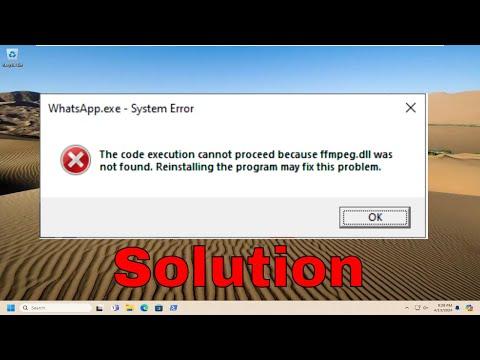I remember the first time I encountered the frustrating error message: “The code execution cannot proceed because ffmpeg.dll was not found.” It was during a crucial project, and the sudden appearance of this issue threw a wrench into my progress. I had been working on a multimedia application that relied on FFmpeg for handling video and audio processing tasks. Everything was going smoothly until this error popped up out of nowhere.
The project was a significant one for me. It involved developing a video editing tool that integrated various multimedia features, including video compression and format conversion. I had been using FFmpeg, a powerful open-source library, to handle the complex tasks of video and audio processing. FFmpeg is renowned for its robustness and flexibility, making it an essential tool for many developers working in multimedia.
The error message appeared when I attempted to run my application after making some updates to the code. At first, I thought it might be a minor issue with my build environment or perhaps a missing dependency. However, as I dug deeper, it became clear that the problem was more specific: the ffmpeg.dll file was missing.
I started by verifying that the ffmpeg.dll file was indeed absent from the directory where my application expected it to be. I checked the path specified in the project settings and confirmed that the file was not there. This was a critical issue because ffmpeg.dll is a dynamic link library that contains essential functions used by the FFmpeg framework. Without it, my application couldn’t access these functions, which meant that it couldn’t perform its intended tasks.
My first step in resolving this issue was to download the latest version of FFmpeg from the official website. I went to the FFmpeg download page and obtained the appropriate build for my operating system. After downloading the archive, I extracted its contents and located the ffmpeg.dll file.
With the ffmpeg.dll file in hand, I placed it in the directory where my application was looking for it. I also made sure to add the path to the directory containing ffmpeg.dll to my system’s PATH environment variable. This step was crucial because it ensured that my application could locate the DLL file regardless of its current working directory.
Despite these efforts, the issue persisted. It became apparent that there might be more to the problem than just a missing file. I decided to explore further and check if there were any additional dependencies that ffmpeg.dll might require. Using a tool like Dependency Walker, I analyzed the ffmpeg.dll file to identify any other missing components that could be causing the issue.
Dependency Walker revealed that ffmpeg.dll had dependencies on several other DLL files that were not present on my system. This discovery led me to download and install the required libraries to ensure that all dependencies were met. After installing these libraries, I placed them in the same directory as ffmpeg.dll and tried running my application again.
This time, the error message disappeared, and my application launched successfully. It was a relief to see that everything was working as expected. However, this experience taught me valuable lessons about managing dependencies and ensuring that all required files are present for an application to run correctly.
To prevent similar issues in the future, I decided to adopt a more systematic approach to managing dependencies. I began to document all the libraries and components my projects relied on and created a checklist to verify their presence before deployment. Additionally, I explored using dependency management tools that could automate the process of handling and resolving dependencies.
In summary, encountering the “ffmpeg.dll not found” error was a challenging experience, but it provided me with valuable insights into the importance of managing dependencies in software development. By taking the necessary steps to resolve the issue, such as downloading the correct DLL files, adding them to the appropriate directories, and addressing additional dependencies, I was able to overcome the problem and ensure that my application functioned as intended. This experience reinforced the importance of thorough preparation and proactive troubleshooting in software development.
